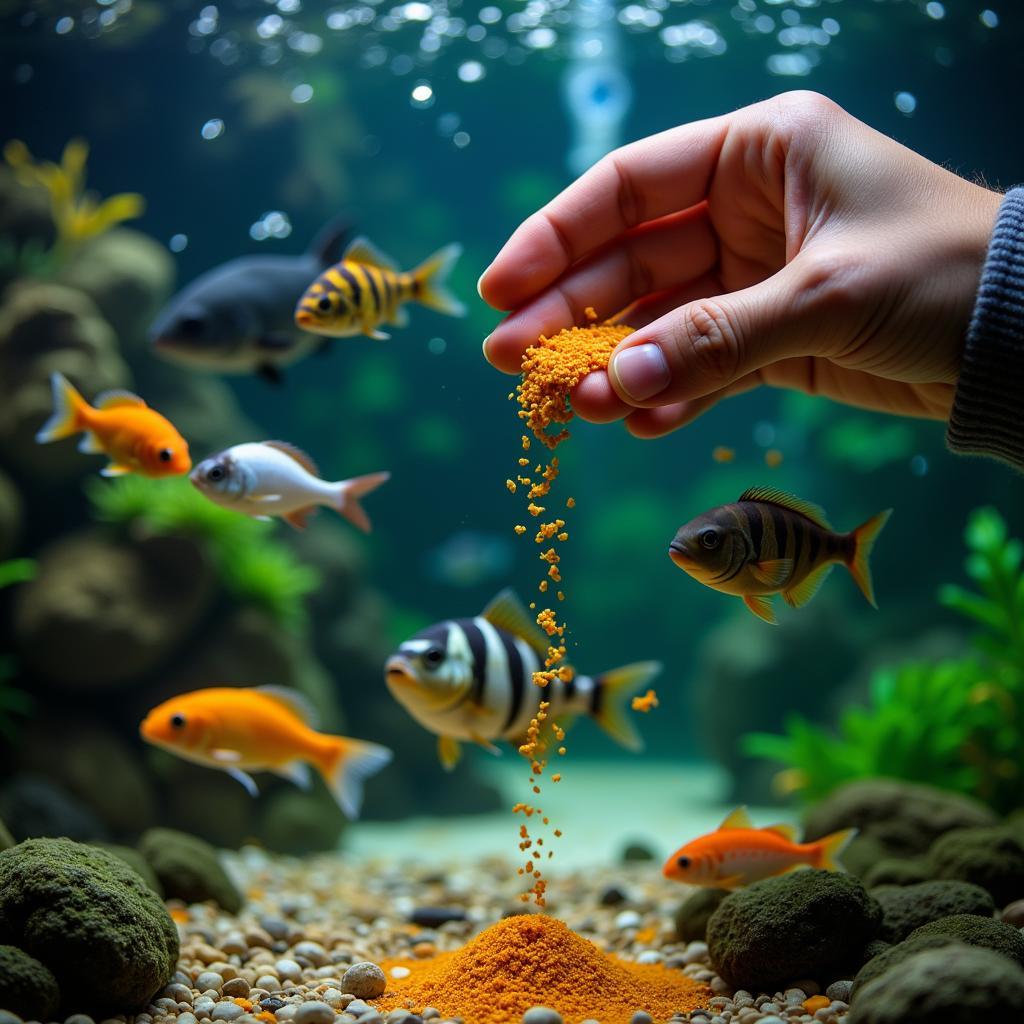Aqua Fish Food, a cornerstone of aquatic life, plays a crucial role in the health and vibrancy of our finned friends. Whether you’re a seasoned aquarist or just starting your journey into the underwater world, understanding the nuances of fish nutrition is essential. This guide delves into the different types of aqua fish food, their benefits, and how to choose the perfect diet for your aquatic companions.
Decoding the Diet: Types of Aqua Fish Food
The world of aqua fish food is incredibly diverse, catering to the specific needs of different fish species. From flakes and pellets to frozen and live options, understanding the various types is crucial for providing optimal nutrition.
- Flakes: A common and convenient choice, flakes offer a balanced diet for many fish species. They float on the surface, making them ideal for top-feeding fish.
- Pellets: These sinking food options are perfect for bottom-dwelling species. They come in various sizes to suit different fish sizes and mouth shapes. micro pellet fish food are especially helpful for smaller species or fry.
- Frozen Food: Packed with nutrients, frozen options like bloodworms, brine shrimp, and mysis shrimp provide a natural and enriching diet.
- Live Food: For those seeking the ultimate natural diet, live food options like daphnia and mosquito larvae offer stimulation and nutritional benefits. However, they carry a higher risk of introducing parasites or diseases into the tank. If you’re looking for a live food alternative, you could consider fish food worms.
- Wafers: Specifically designed for bottom-feeding fish like catfish and loaches, wafers sink quickly and provide a concentrated source of nutrition.
 Selecting the Appropriate Aqua Fish Food for Your Fish
Selecting the Appropriate Aqua Fish Food for Your Fish
What Nutrients Does My Fish Need?
Just like humans, fish require a balanced diet to thrive. Essential nutrients include protein, carbohydrates, fats, vitamins, and minerals. The right balance of these nutrients promotes healthy growth, vibrant coloration, and a robust immune system. Protein is especially crucial for muscle development, while fats provide energy.
Tailoring the Diet: Species-Specific Needs
Different species have unique dietary requirements. Herbivorous fish, for example, require a diet rich in plant matter, while carnivorous species need a protein-rich diet. Researching your fish’s specific dietary needs is essential for their well-being. If you’re looking for something different, consider gelatin fish food as a supplemental option.
How Much and How Often Should I Feed My Fish?
Overfeeding is a common mistake that can lead to poor water quality and health issues. A general rule of thumb is to feed only what your fish can consume within a few minutes. Feeding frequency depends on the species, but most adult fish can be fed once or twice a day.
What is Aqua Fish Food Made Of?
Aqua fish food is formulated using a variety of ingredients, including fish meal, fish oil, plant proteins, grains, and vitamins and minerals. High-quality aqua fish food will list the ingredients in order of prevalence, with the most abundant ingredient listed first.
Ensuring Quality: Choosing the Right Brand
Choosing a reputable brand is vital for ensuring the quality and safety of your aqua fish food. Look for brands that are known for their high-quality ingredients, balanced formulations, and rigorous quality control. For something unique, check out bug bite fish food.
Conclusion
Aqua fish food, a fundamental element of aquarium keeping, directly impacts the health and happiness of your aquatic pets. By understanding the nuances of fish nutrition and choosing the right diet, you can create a thriving underwater ecosystem. Remember, providing a balanced and appropriate diet is key to ensuring your fish live long, healthy, and vibrant lives.
Expert Insights:
- Dr. Amelia Reed, Aquatic Veterinarian: “Providing a varied and balanced diet is just as important for fish as it is for any other pet. It’s crucial for their overall health and longevity.”
- Professor Michael Davies, Marine Biologist: “Understanding your fish’s natural diet in the wild can provide valuable insights into their nutritional needs in the aquarium.”
For any assistance, contact us at Phone Number: 02437655121, Email: minacones@gmail.com Or visit us at: 3PGH+8R9, ĐT70A, thôn Trung, Bắc Từ Liêm, Hà Nội, Việt Nam. We have a 24/7 customer support team.